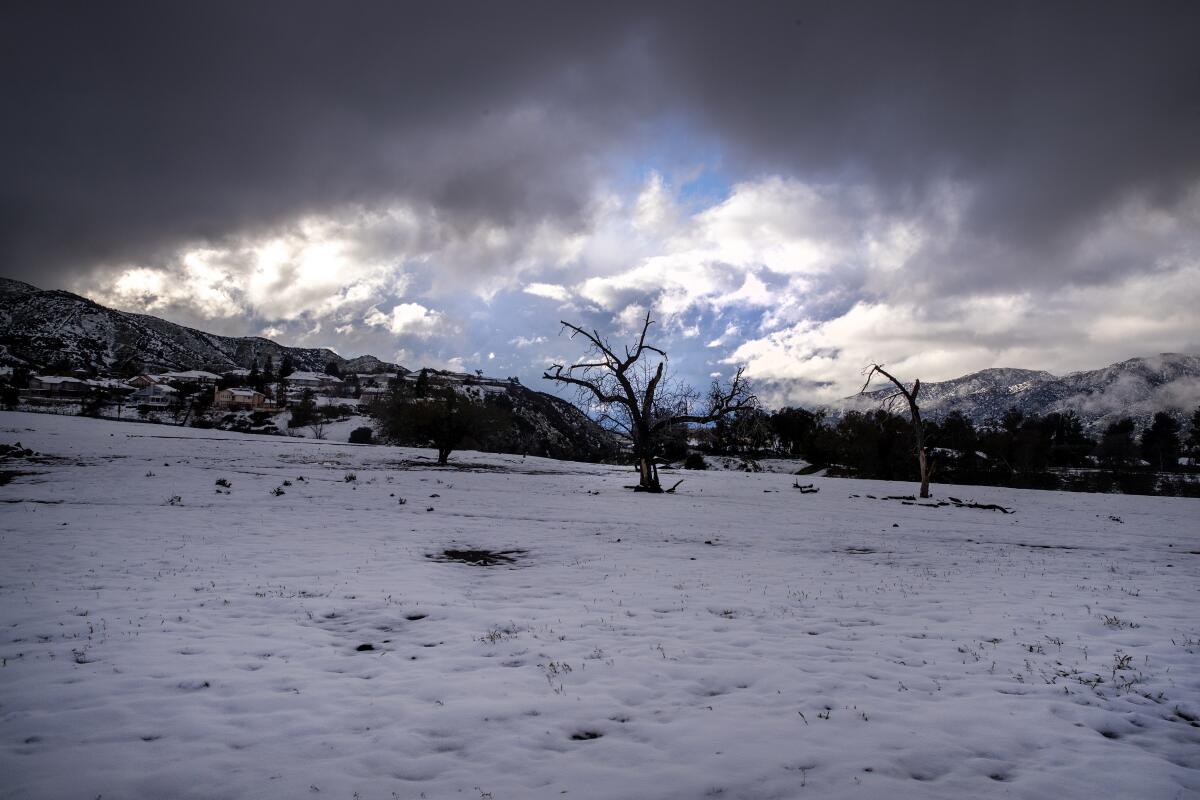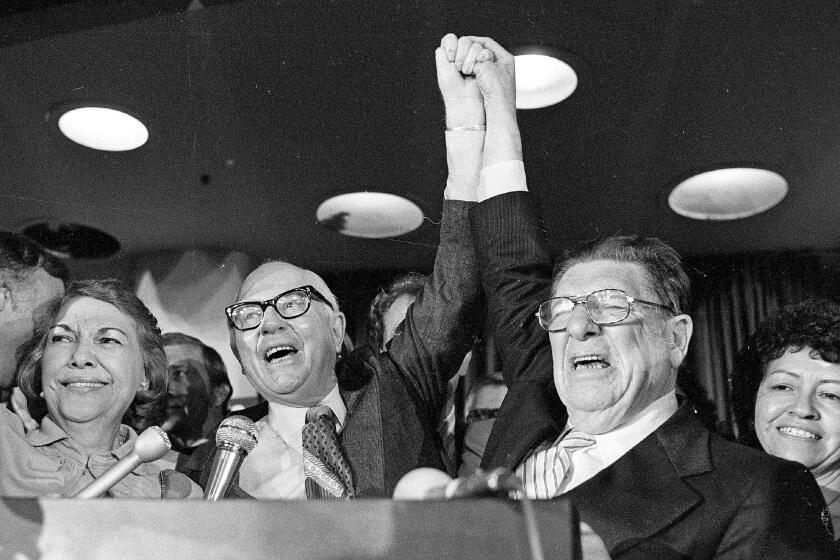Newsletter: Snow in L.A. feels like a reprieve from climate change, and it’s amazing

- Share via
Good morning. I’m Paul Thornton, and it is Saturday, Feb. 25, 2023. Let’s look back at the week in Opinion.
Los Angeles is one of the less interesting places to live for an amateur weather geek like me (the kind of person with a half-dozen weather apps on his phone but zero expertise in meteorology or climatology). So you can imagine how exciting a few days of local blizzard warnings and sub-50-degree high temperatures have been for someone used to sunny and 70 in February. Good weather spoils us in Southern California — but it bores us too, so we appreciate the break. (And as enticing as 10 feet of new snow in the local mountains might be, consider putting off that hike or staying off those dangerously icy roads to Big Bear or Mt. Baldy this weekend.)
Looming over every weather story is the inescapable threat of climate change. Downpours or dry spells, extreme heat or unprecedented cold — it’s all amplified or in some way connected to the increasing concentration of greenhouse gases in the Earth’s atmosphere. As the years pass and average temperatures inch upward, every cold winter storm that brings snow to the mountains feels like a reprieve from global warming, a merciful delay of the inevitable. I spend a lot of time with my children near Big Bear Lake, which sits around 6,800 feet in the San Bernardino Mountains and hasn’t been full since 2011 (though this wet winter will help). Whenever we’re caught in a snowstorm there, I hope the experience imprints firmly on my kids’ consciousness, so they can hold onto memories in the “no snow” future they stand to inherit.
This cold storm, however, stands out, and in a good way: It doesn’t appear to be substantially caused by climate change. That’s according to atmospheric scientist Ned Kleiner, a Harvard doctoral candidate who took to The Times’ op-ed page this week to explain the perfectly normal phenomena responsible for our atypical weather:
“You can picture this week’s pressure systems as enormous rotating masses of air. The low-pressure zone is a huge bowl of cold air sitting over the western half of the country, spinning counterclockwise and rushing eastward. The warm front is more like a giant dome of warmth; it’s spinning clockwise and shielding the Southeast and mid-Atlantic states from the storm’s effects. The strength and size of these systems are determined mostly by two factors: the temperature difference between the North Pole and the equator (which is actually getting smaller as the climate changes) and the rotation rate of the Earth, which humans have had little (but not zero!) effect on....
“In California ... the more disruptive storm is the second one, which, in contrast to its speedy older sibling, is traveling at a leisurely pace over the state for two days or more. It is bringing rain to the valleys, snow to the mountains and high wind to everywhere. Because it is being carried in from the north by the mass of cold air, it will bring a lingering chill to the region even after the wind and rain have run their course; Southern California will remain up to 20 degrees colder than normal until the first few days of March.”
Comforting as his explanation may be, Kleiner reminds us that climate change remains the longer-term influence on winter weather in California. It will still get cold here — no one ever said global warming means the end of winter — but average temperatures will still rise, and aridification will continue. For a chilling read (no pun intended) on that, I recommend The Times’ editorial from nearly two years ago with the jarringly ironic headline, “There is no drought.”
Still, it’s nice to get a break. Enjoy those stunning views of big white mountains.
How long will Russians tolerate Vladimir Putin’s war? Since their president launched his full-scale invasion of Ukraine one year ago, Russians have seen their economy stall, young people flee and many thousands of their soldiers die. Still, they support their president, attend pro-war rallies and generally keep their heads in the sand. This paints a grim picture of the Russian citizenry, writes Rutgers political scientist Alexander J. Motyl, but not all hope is lost: “Russians can act collectively and autonomously when repression is reduced and the threat of immediate arrest recedes. And that’s partly because, even today, many Russians continue to harbor views that are critical of Putin and the regime.” L.A. Times
More on the one-year anniversary of Russia’s attack: Ukraine has been under relentless attack, but its citizens have ample reason to hope. Mikhail Alexseev, an international relations professor at San Diego State University, says President Biden’s surprise visit to Kyiv shows why. On the Russian side, Putin’s suspension of the implementation of the last remaining nuclear arms treaty with the United States will have limited immediate effects and could actually entail costs for Moscow. Still, U.S. Naval War College professor David C. Logan says it signals the grim state of nuclear arms control in the world today.
Fox News’ lies about Trump’s defeat probably aren’t protected by the 1st Amendment. There’s getting the facts wrong, and then there’s what Fox News’ Tucker Carlson did when he appeared to admit privately to his colleagues that one of the lawyers pushing election conspiracies was “lying.” Former U.S. attorney Harry Litman writes: “Mistakes are one thing; knowingly telling lies is another. What Fox’s pious proclamation of press freedom misses is that lies of the sort the network appears to have told its viewers don’t enjoy or deserve constitutional protection. The values enshrined in Sullivan [vs. New York] are not what shields Fox but rather what puts it in jeopardy.” L.A. Times
Enjoying this newsletter? Consider subscribing to the Los Angeles Times
Your support helps us deliver the news that matters most. Become a subscriber.
Is L.A.’s anti-camping law getting homeless people off sidewalks and into housing? Let’s find out. Two years ago, the L.A. City Council passed a controversial ordinance prohibiting camping by homeless people near schools, day-care centers, parks and any other place that it wanted to deem off-limits in the future. Locations have been added since then with little opposition, but more council members are starting to withhold their support. The editorial board endorses the proposal by one of those members to analyze what the city’s anti-camping law has actually accomplished in two years. L.A. Times
Hey, Little League dads, make room for more female coaches. Avni Shah wants to help manage her son’s baseball team, but in an email to parents about assistant coaching, the head coach mentioned only “awesome dads” who volunteered. This reflects a broader attitude in youth sports that is still unwelcoming to women in positions of leadership, Shah writes: “It would be easier to step into these spaces if they felt more accessible and welcoming. But until there are more efforts to support and recruit female coaches for our kids’ teams, I’m hoping I can find mentorship and support. And, just maybe, I’ll experience some of the joy of being a coach to my kids felt by so many of the men around me, as they tap into the childhood nostalgia of playing ball with their own dads.” L.A. Times
Stay in touch.
If you’ve made it this far, you’re the kind of reader who’d benefit from subscribing to our other newsletters and to The Times.
As always, you can share your feedback by emailing me at [email protected].
A cure for the common opinion
Get thought-provoking perspectives with our weekly newsletter.
You may occasionally receive promotional content from the Los Angeles Times.




